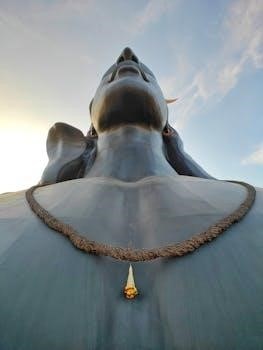When the Emperor Was Divine⁚ A Comprehensive Guide
“When the Emperor Was Divine”, penned by Julie Otsuka, provides a
poignant exploration of a Japanese-American family’s internment during
World War II. A comprehensive guide delves into its themes, characters,
historical context, and the author’s narrative style, enhancing readers
understanding
Julie Otsuka’s “When the Emperor Was Divine” unfolds the story of a Japanese-American family’s harrowing experience during World War II. Set against the backdrop of Executive Order 9066, the novel begins in Berkeley, California, where a mother and her two children are forced to leave their home following the father’s arrest. The narrative traces their journey to an internment camp in the Utah desert, detailing the harsh conditions, loss of freedom, and the psychological toll of displacement.
The family grapples with the challenges of camp life, clinging to memories of their past while struggling to maintain hope for the future. The absence of the father weighs heavily on them, and the mother fights to protect her children from the pervasive prejudice and uncertainty. Upon their return home after the war, they face further discrimination and the daunting task of rebuilding their lives. The novel explores themes of identity, resilience, and the enduring impact of wartime trauma on individuals and communities, subtly hinting at the lost innocence and changes experienced by Japanese-Americans during the war.
Character Analysis
In “When the Emperor Was Divine,” Julie Otsuka masterfully crafts compelling characters who embody the experiences of Japanese Americans during World War II internment. The mother, stoic and resilient, serves as the family’s anchor, meticulously packing their belongings and striving to maintain normalcy amidst upheaval. Her unwavering dedication to her children highlights the strength and sacrifices made by women during this tumultuous period.
The son, innocent and observant, provides a childlike perspective on the harsh realities of camp life; His fantasies about his father’s return reveal his longing for stability and a sense of belonging. The daughter, perceptive and introspective, grapples with questions of identity and belonging as she navigates the complexities of prejudice and discrimination. The father, initially absent, returns a changed man, haunted by his experiences in detention centers. His silence and withdrawal underscore the profound psychological impact of internment, leaving the family to grapple with a fractured sense of self and community.

Themes in the Novel
“When the Emperor Was Divine” intricately explores several profound themes, including the impact of war and racism on individuals and families. The novel delves into the loss of identity experienced by Japanese Americans during internment, as they were stripped of their homes, possessions, and civil liberties solely based on their ethnicity. Otsuka examines the struggle with morality under extreme circumstances, highlighting the ethical dilemmas faced by those confined in the camps.
The resilience of the human spirit emerges as a central theme, as the family navigates hardship and injustice with unwavering determination. Memory and forgetting play a crucial role, as the characters grapple with the desire to preserve their past while confronting the painful realities of their present. The novel also explores the complexities of family relationships under duress, showcasing the bonds that sustain them through trauma and displacement. Through lyrical prose, Otsuka invites readers to reflect on the enduring consequences of prejudice and the importance of remembering historical injustices.
Historical Context⁚ Japanese-American Internment
The historical backdrop of “When the Emperor Was Divine” is the Japanese-American internment during World War II, a dark chapter in American history. Following the attack on Pearl Harbor in 1941, President Franklin D. Roosevelt signed Executive Order 9066 in 1942, authorizing the forced removal and incarceration of over 120,000 people of Japanese descent, most of whom were American citizens. This act was fueled by wartime hysteria, racial prejudice, and unfounded fears of espionage.
Japanese Americans were given minimal notice to liquidate their assets, sell their homes and businesses, and report to assembly centers. They were then transported to remote internment camps located in desolate areas across the country. These camps were often overcrowded, with inadequate living conditions and limited resources. The internees faced significant emotional and psychological trauma, as they were subjected to surveillance, restrictions on their freedom, and the constant reminder that they were viewed as disloyal based solely on their ancestry. The internment lasted for several years, and it wasn’t until 1988 that the U.S. government formally apologized and provided reparations to the survivors.
Julie Otsuka’s Writing Style and Narrative Technique
Julie Otsuka’s writing style in “When the Emperor Was Divine” is characterized by its simplicity, precision, and emotional resonance. She employs a minimalist approach, using spare prose and evocative imagery to convey the profound impact of internment on a Japanese-American family. Otsuka’s language is both accessible and poetic, creating a powerful reading experience.
Otsuka’s narrative technique is equally distinctive. She utilizes a shifting point of view, initially employing a distant third-person perspective that gradually becomes more intimate. This allows the reader to observe the family’s experiences from both an objective and subjective standpoint. The novel is divided into sections, each focusing on a different stage of the family’s journey, and narrated through different perspectives of each of the family members. The absence of character names further emphasizes the collective experience of Japanese Americans during this period. The final section shifts to a first-person monologue by the father, offering a deeply personal and raw account of his trauma and defiance. Otsuka’s deliberate choices create a multi-layered narrative that invites reflection on identity, memory, and the enduring consequences of historical injustice.

Analysis of “Evacuation Order No. 19”
“Evacuation Order No. 19,” the opening section of Julie Otsuka’s “When the Emperor Was Divine,” serves as a stark introduction to the forced removal of Japanese Americans during World War II. The chapter centers on the mother, who upon seeing the evacuation notice posted in Berkeley, California, begins the methodical process of preparing her family for internment.
The chapter’s power lies in its understated tone and the mother’s matter-of-fact actions. She kills the family’s old dog, releases a pet bird, and packs their belongings with a quiet resignation, highlighting the abrupt disruption of their lives. The absence of emotional outbursts underscores the sense of shock and disbelief that likely accompanied such a devastating order.
Otsuka’s choice to begin the novel with this scene emphasizes the dehumanizing nature of the evacuation process. The family is reduced to a number on a government document, stripped of their rights and dignity. The mother’s actions, though seemingly mundane, are imbued with a sense of loss and the weight of an uncertain future. “Evacuation Order No. 19” effectively sets the stage for the novel’s exploration of the internment experience and its lasting impact on the Japanese-American community.
The Family’s Experience in the Internment Camp

The majority of “When the Emperor Was Divine” focuses on the family’s life within the internment camp, revealing the harsh realities and emotional toll of their confinement. The narrative shifts to the perspective of the young boy, offering a child’s-eye view of the camp’s strict rules, barren landscape, and the constant struggle for normalcy.
The family grapples with the loss of their home, their freedom, and their sense of identity. The mother battles a growing depression, while the children attempt to cling to memories of their former life, particularly their absent father. The boy’s fantasies about his father’s presence at the camp highlight his longing for stability and the desire to make sense of their situation.
Otsuka vividly portrays the challenges of daily life in the camp⁚ the poor living conditions, the lack of privacy, and the constant surveillance. Despite these hardships, the family finds ways to create moments of connection and resilience. They form bonds with other internees, share stories, and try to maintain a sense of community in the face of adversity. The internment camp becomes a microcosm of society, where the family must navigate prejudice, loss, and the enduring power of the human spirit.
The Impact of the War on the Father
The father’s absence looms large throughout much of “When the Emperor Was Divine,” and his eventual return reveals the profound impact of the war and his detention on his psyche. He is initially taken away by the FBI, leaving his family to face internment without him. The children hold onto memories of him, creating an idealized image that contrasts starkly with the man who returns.
Upon his return, the father is a changed man, physically aged and emotionally distant. The experiences he endured in the detention centers have left him scarred, and he struggles to reintegrate into family life. He is unable to return to work, and it is implied that the trauma he suffered has left him with depression and paranoia.
The father’s transformation symbolizes the broader impact of the war on Japanese-American men, who were often unjustly accused and subjected to harsh treatment. His silence and withdrawal reflect the difficulty of articulating the pain and humiliation they endured. The final chapter, a monologue in the father’s voice, reveals his simmering anger and resentment, highlighting the lasting damage caused by prejudice and injustice. The war steals not only his freedom but also his identity, leaving him a shadow of his former self.
The Family’s Return Home and Reintegration Challenges
Following their release from the internment camp, the family’s return home to Berkeley, California, marks the beginning of a new set of challenges. Although they are physically back in their house, the sense of home has been irrevocably altered. The house itself has been occupied by renters who left it in disarray, symbolizing the disruption and violation they experienced.
The family faces significant difficulties in reintegrating into their community. Their neighbors are distant and unwelcoming, reflecting the pervasive prejudice and suspicion that remain even after the war. The mother struggles to find employment, highlighting the economic hardships faced by many returning Japanese-Americans. The children, while initially excited to be home, gradually realize that their lives will never be the same.
The return home is not a triumphant homecoming but a stark reminder of the losses they have suffered. They grapple with the emotional scars of internment, the loss of their sense of belonging, and the struggle to rebuild their lives in a society that still views them with suspicion. The challenges they face underscore the enduring impact of the war and the long road to recovery for Japanese-Americans.
Symbolism in “When the Emperor Was Divine”
Julie Otsuka’s “When the Emperor Was Divine” is rich in symbolism, enhancing the novel’s exploration of identity, loss, and the impact of war. The title itself is symbolic, referencing a time when the Japanese Emperor was considered divine, subtly hinting at the lost innocence and the shattered faith of Japanese-Americans during World War II.
The family’s belongings, meticulously packed and later discarded, symbolize their uprooted lives and the material losses they endure. The train journey to the internment camp represents the forced displacement and the loss of freedom; The barbed wire fences of the camp serve as a stark symbol of confinement and the denial of basic human rights.
The father’s absence and his eventual return as a changed man symbolize the profound psychological damage inflicted by the internment experience. The desert landscape of the camp reflects the barrenness and desolation of their lives. The mother’s attempts to restore their house after the war symbolize her efforts to reclaim their past and rebuild their shattered lives.

Discussion of the Title’s Significance
The title, “When the Emperor Was Divine,” holds a profound significance within the context of Julie Otsuka’s novel. It alludes to a period in Japanese history when the Emperor was revered as a god, embodying national identity and spiritual authority. This reverence was deeply ingrained in Japanese culture, shaping values and beliefs.
By using this title, Otsuka subtly highlights the irony and the tragic consequences faced by Japanese-Americans during World War II. While the Emperor was considered divine in Japan, Japanese-Americans were viewed with suspicion and hostility in the United States, leading to their unjust internment. The title underscores the stark contrast between the perceived loyalty to the Emperor and the reality of their treatment.
The phrase “was divine” suggests a past reality, implying that this belief, and perhaps the innocence associated with it, has been lost or shattered. It reflects the disillusionment and the erosion of identity experienced by the characters as they grapple with their displacement and the prejudice they face. The title serves as a poignant reminder of the complexities of identity and the devastating impact of war on individuals and communities.
The Ending and Its Implications
The ending of “When the Emperor Was Divine” is deliberately open-ended and unsettling, leaving a lasting impression on the reader. The final chapter shifts to the perspective of the father, who delivers a mock confession, sarcastically admitting to all the accusations leveled against him. This confession highlights the absurdity and injustice of the internment, where guilt was predetermined by race rather than evidence.
The father’s monologue reveals the deep-seated anger and resentment that festered within him during his imprisonment. It underscores the loss of identity and the dehumanization experienced by Japanese-Americans who were stripped of their rights and treated as enemies. The ending offers no easy resolution or sense of closure, reflecting the ongoing trauma and the challenges of reintegration faced by the family.
The implications of the ending are profound. It forces readers to confront the uncomfortable truths about American history and the lasting consequences of prejudice and discrimination. It raises questions about collective responsibility and the need for remembrance and reconciliation. By leaving the story unresolved, Otsuka compels readers to reflect on the complexities of war, identity, and the enduring impact of injustice on individuals and communities. The ending serves as a powerful reminder of the importance of vigilance against repeating the mistakes of the past.
